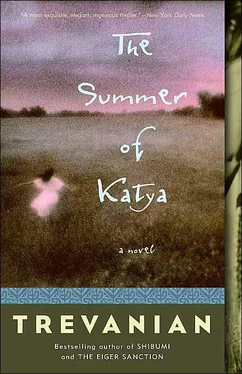Rodney Whitaker - The Summer of Katya
Здесь есть возможность читать онлайн «Rodney Whitaker - The Summer of Katya» весь текст электронной книги совершенно бесплатно (целиком полную версию без сокращений). В некоторых случаях можно слушать аудио, скачать через торрент в формате fb2 и присутствует краткое содержание. Город: New York, ISBN: , Издательство: Crown Publishing Group, Жанр: Триллер, Современные любовные романы, на английском языке. Описание произведения, (предисловие) а так же отзывы посетителей доступны на портале библиотеки ЛибКат.
- Название:The Summer of Katya
- Автор:
- Издательство:Crown Publishing Group
- Жанр:
- Год:неизвестен
- Город:New York
- ISBN:1400098041
- Рейтинг книги:4 / 5. Голосов: 1
-
Избранное:Добавить в избранное
- Отзывы:
-
Ваша оценка:
- 80
- 1
- 2
- 3
- 4
- 5
The Summer of Katya: краткое содержание, описание и аннотация
Предлагаем к чтению аннотацию, описание, краткое содержание или предисловие (зависит от того, что написал сам автор книги «The Summer of Katya»). Если вы не нашли необходимую информацию о книге — напишите в комментариях, мы постараемся отыскать её.
The Summer of Katya — читать онлайн бесплатно полную книгу (весь текст) целиком
Ниже представлен текст книги, разбитый по страницам. Система сохранения места последней прочитанной страницы, позволяет с удобством читать онлайн бесплатно книгу «The Summer of Katya», без необходимости каждый раз заново искать на чём Вы остановились. Поставьте закладку, и сможете в любой момент перейти на страницу, на которой закончили чтение.
Интервал:
Закладка:
“Perhaps,” Paul Treville said, “we could say that Father scratches for his supper… or does that have an unfortunately canine implication?”
Monsieur Treville looked up from the rich potage that had occupied his attention since sitting down, and he blinked. “I beg your pardon? Did you speak to me?”
“More of than to, Papa,” Paul said.
Monsieur Treville nodded. “Aha! I thought so. Yes, I thought so.” He turned to me. “So you are a doctor, are you?”
“My superior in the village, Dr. Gros, might dispute that, sir. But in fact I have leapt all the barriers of doubt and memorized all the rote trivia required to affix the word Doctor to my name.” I blush even now to recall those memorized set pieces I used to trot out when the occasion presented itself.
“Yes, but are you a doctor or not?” the old man asked, inadvertently deflating my pompous phrasing by failing to comprehend it.
“Yes, sir, I am.” From the first moment, I took a liking to Monsieur Treville and his vague, absent-minded ways, although we had been at the table the better part of ten minutes before he realized I was sitting amongst them. His large, open features, his thick grey hair tousled with fingers raked through it nervously as he studied, his clear eyes sparkling with intelligence and almost boyish energy whenever he spoke of something of interest to him—all of these were my ideal image of the kindly old scholar. Then too, he was Katya’s father.
“Doctor, eh?” Monsieur Treville said. “Oh yes, of course!” He turned to Paul. “You had some sort of accident, didn’t you? Fell over something, wasn’t it?”
“I fell off the roof, Papa, while I was trying to catch clouds in a net. Fortunately, I landed headfirst in a pool of crocodiles and that broke my fall.”
“Yes, yes, I remember. So you’re a doctor, young man. That’s very interesting. Your studies didn’t happen to lead you to an interest in medieval village life by any chance, did they?”
I glanced in confusion at Katya, who smiled impishly. “Ah… well, not in any very direct way, sir. But I’ve always been fascinated by the subject.”
Monsieur Treville’s face lit up. “Oh? Have you indeed? What aspects particularly interest you?”
“Yes, Doctor,” Paul said, leaning forward with mock interest. “Do tell us.”
Katya gave him a reproving frown, but he raised his eyebrows in blandest innocence, as I stammered out, “Well… the whole topic is fascinating. Particularly… ah… particularly the medical… ah…”
“The plague!” Monsieur Treville injected. “Yes, I am sure the arrival of the Black Death in ‘48/’49 would be of particular interest to a doctor.”
“That would be 13 48 and ‘49,” young Treville clarified helpfully.
Monsieur Treville frowned at his son and blinked several times. “Did someone say something about crocodiles? What’s all this about crocodiles?”
“I didn’t understand that completely myself, Father,” Paul confessed. “Something to do with the Great Plague perhaps. Could you clarify that for us, Doctor?”
“No, no, young man,” Monsieur Treville said laying his hand on my arm and chuckling. “Rats! Rats and lice. Nothing to do with crocodiles at all. Possibly the fact that the plague entered Europe through Mediterranean ports gave birth to this fiction about crocodiles—though I confess that I’ve never run across the legend myself. You wouldn’t happen to recall where you read it, would you?”
Katya came to my rescue, diverting the conversation into light channels until dinner had progressed to the fruit and a disk of the strong, salty local cheese, at which Paul poked distastefully with the tip of his knife. I could sense that Katya was pleased with me, pleased with my evident liking for her father and with his delight at having someone new with whom to talk. My romantic imagination staged domestic daydreams concerning an at-home dinner with the brother-in-law and father-in-law visiting our modest (but charming) home, and in neglect of my social responsibilities I allowed myself to become lost in these pleasant reveries to such a depth that I was quite surprised when Monsieur Treville’s voice intersected my egoistic wanderings.
“…or don’t you agree, Doctor?”
“Ah… yes. Yes! I do indeed agree. Yes, indeed.”
Monsieur Treville’s eyes sparkled with interest. “That’s fascinating, Doctor. I need hardly tell you that very few modern scholars of medieval life share our view on this. Would you mind telling me what evidence brought you to this opinion?”
“What evidence? Ah… well, not so much any given single bit of evidence as… ah… as the general impression I… ah…”
Katya earned my undying gratitude when she placed her hand on my arm and interrupted, saying, “Now you two mustn’t spend the whole evening talking about things that Paul and I don’t understand.”
“I don’t mind,” Paul said. “In fact, I’d be delighted to hear Montjean’s response.” He smiled at me broadly. Then he made a sudden motion, and I realized that Katya had kicked him under the table.
“No,” she said, “I won’t have it. We shall take our coffee in the salon like well-bred people, and we shall talk of trivial and amusing things, as we were taught to do when we were young.” She stood and offered me her arm. “Dr. Montjean?”
For half an hour, as we four sat around the good fire in the hearth, Katya was as good as her word, guiding the conversation from one subject to another with such subtle skill that each of us—even Paul—had his moment to shine forth and appear witty and well-informed. Brandy was served with the coffee, and I noticed that Paul refilled his glass more often than was wise and ended with sitting deep in his chair with a leaden and dour attitude that bordered on the inhospitable, but my delight in and admiration of Katya over-weighed my feelings towards her brother and I was left with the impression that I had never passed a more pleasant and entertaining evening, though I could recall no single event of particular moment.
Paul broke the spell by rising suddenly and saying, “I’m afraid that Katya should be going to bed soon.”
“Really, Paul—” she protested.
“No, no Kiki.” Paul crossed to her and put his arm around her waist. “You’ve risked catching a cold, being out in the rain. Now you must go to bed, pull the covers up to your nose, and count crocodiles. You’ll be asleep in no time. Father and I will entertain Dr. Montjean.”
“Have you been out in the rain?” Monsieur Treville asked Katya with concern.
“Not really, Father,” Paul answered. “Just a figure of speech.”
Monsieur Treville blinked. “Figure of speech?”
“Yes, and a silly and ineffective one too. I promise I’ll never use it again. Now, up you go, Kiki.”
“Good-night, Papa,” Katya said, giving him a kiss on the cheek. “And good-night to you, Jean-Marc Montjean.” She held her hand out for me to press. I was pleased at the way she had devised of using my given name so soon in our acquaintance. “Will I have the pleasure of seeing you so soon?”
“Never fear,” Paul said. “The doctor has promised—or perhaps it was a threat—to come by tomorrow to bind up my wounds. No doubt we shall be able to persuade him to take a cup of tea with us.”
“I shall look forward to it, Mlle Treville,” I said, my eyes full of her.
“So shall I.”
After she left, Monsieur Treville settled back in his chair as though for a good long talk and asked me how long I had been devoted to the study of the Black Death….
….An hour later, when finally Paul was seeing me to the door, the rain had lightened to a frying hiss on the gravel outside. He had not been sparing of the brandy, and there was something beyond nonchalance in the way he leaned against the archway of the hall door.
Читать дальшеИнтервал:
Закладка:
Похожие книги на «The Summer of Katya»
Представляем Вашему вниманию похожие книги на «The Summer of Katya» списком для выбора. Мы отобрали схожую по названию и смыслу литературу в надежде предоставить читателям больше вариантов отыскать новые, интересные, ещё непрочитанные произведения.
Обсуждение, отзывы о книге «The Summer of Katya» и просто собственные мнения читателей. Оставьте ваши комментарии, напишите, что Вы думаете о произведении, его смысле или главных героях. Укажите что конкретно понравилось, а что нет, и почему Вы так считаете.












